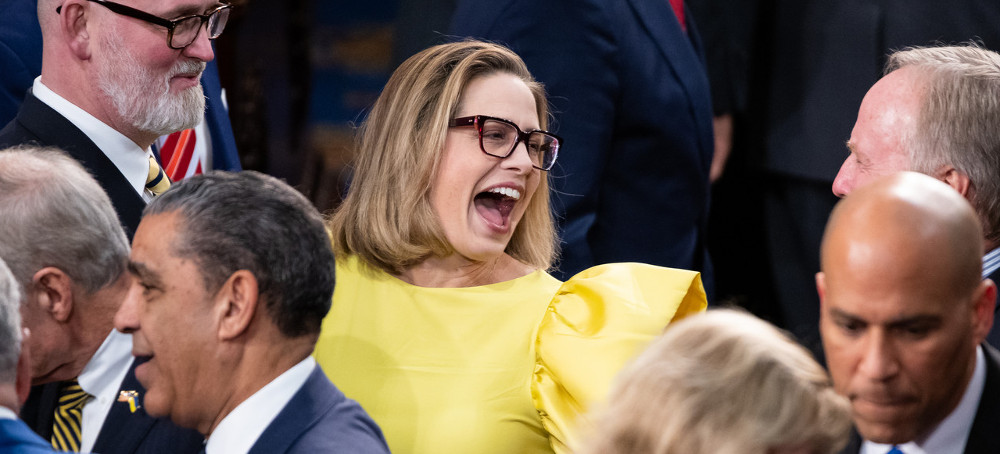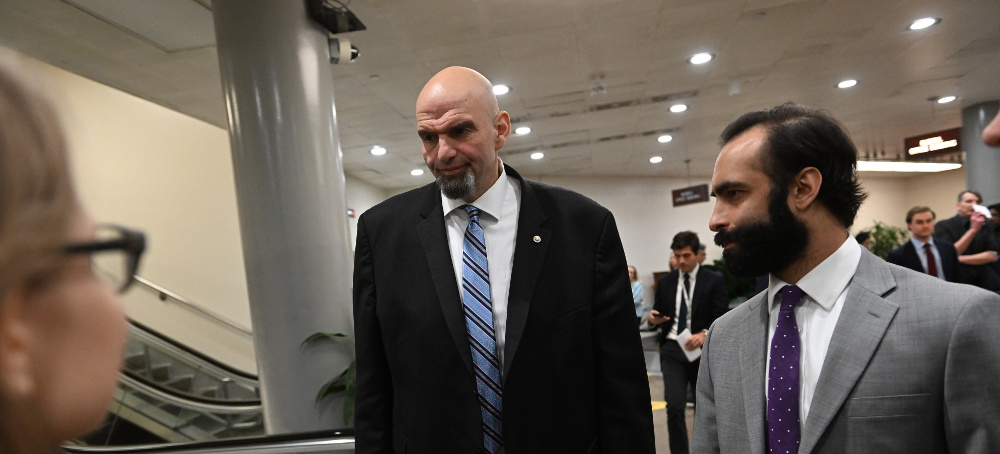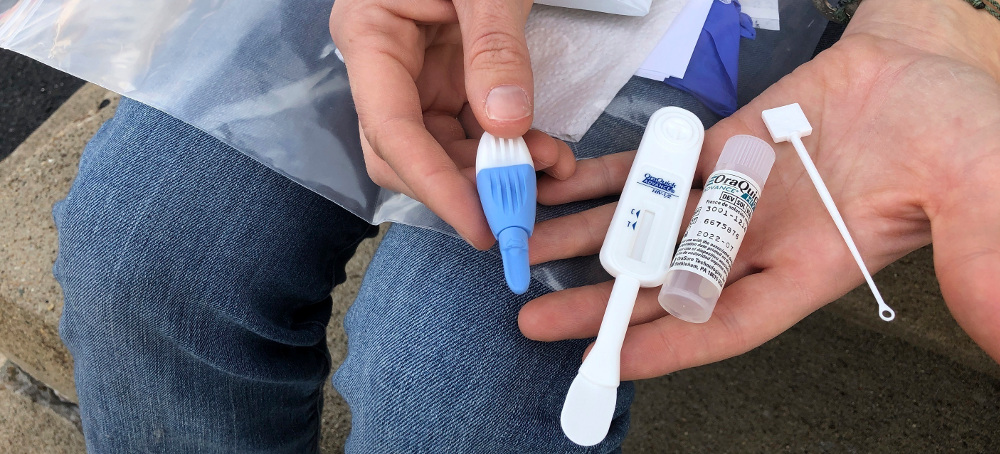Live on the homepage now!
Reader Supported News
The article below is satire. Andy Borowitz is an American comedian and New York Times-bestselling author who satirizes the news for his column, "The Borowitz Report."
According to the note, signed by his New York orthopedist, Carlson sustained “a severe injury to the rotator cuff when he was a Little League pitcher and, as a result, has been unable to raise his right hand for the past forty-five years.”
“Any attempt to raise said hand would result in excruciating, unbearable pain,” the note continued.
The doctor’s note failed to convince Dominion, however, which responded by releasing dozens of photos showing Carlson raising his right hand, including during a mass salute at a Trump rally.
The company also called into question the credibility of Carlson’s orthopedist, Dr. George Santos.
READ MORE Between her Dec. 9 announcement that she was leaving the Democratic Party and the end of the year, Sen. Kyrsten Sinema had raised a bit shy of $25,000 via the ActBlue platform. (photo: Francis Chung/POLITICO)
Between her Dec. 9 announcement that she was leaving the Democratic Party and the end of the year, Sen. Kyrsten Sinema had raised a bit shy of $25,000 via the ActBlue platform. (photo: Francis Chung/POLITICO)
The Arizona senator raised more than $11 million on ActBlue in 2018. Despite leaving the party in December, she’s still on the platform — for now.
The independent Arizona senator, who POLITICO reported has been deriding fellow Democratic senators in recent private fundraisers with Republican donors, this month rolled out a new online fundraising page with Anedot, a platform that has also been used by Republican and third-party candidates.
But her ActBlue page is still active and in use by her campaign committee. The Democratic fundraising platform is the most important fundraising portal in all of politics, and access to it can mean a substantial small-dollar fundraising advantage.
Sinema’s continued presence on the platforms shows the limits of her disdain for the Democratic Party: She might dislike sitting next to the party’s senators during lunch, but she’s still willing to take money from its small-dollar donors. Access to ActBlue could be hugely beneficial if Sinema runs for reelection — and in a three-way race in a state with a large independent vote share, Arizona’s seat could well tip control of a closely divided Senate.
An ActBlue spokesperson confirmed this week that the Arizona senator is still eligible to use the site as an independent with a record of caucusing with Democrats. Sinema was a substantial fundraiser on ActBlue during her 2018 Senate campaign, bringing in more than $11.7 million via the platform that cycle, according to FEC data, although her small-dollar support has largely dried up in the past few years. Between her Dec. 9 announcement that she was leaving the Democratic Party and the end of the year, she had raised a bit shy of $25,000 via the platform.
ActBlue — which has long served candidates facing each other in primaries — has looked to position itself as a neutral actor within the party’s broader fundraising ecosystem. The Arizona senator, who has yet to formally declare a 2024 run, puts that to a new test.
“At the end of the day, ActBlue is an incredibly important technology platform inside an incredibly formidable big tent,” ActBlue CEO Regina Wallace-Jones said in an interview with POLITICO last month. A longtime tech executive and former city councilor from East Palo Alto, Calif., Wallace-Jones was named ActBlue’s new leader in January.
She added: “It would be inappropriate in any way for us to be first movers bearing who is on the platform versus not. And we do have partners inside that tent that we will be taking cues from. So I do not imagine that we will be making that kind of a statement, and I do know that we’re in deep communications with others who have decision-making authority.”
Adding a new fundraising platform is a sign that Sinema is preparing for the possibility of running for reelection, likely as an independent. A spokesperson confirmed Sinema’s campaign is currently using both Anedot and ActBlue, but declined to address what that could mean for her 2024 plans.
Rep. Ruben Gallego (D-Ariz.) announced his own Senate campaign in January, and is widely viewed as the likely Democratic nominee. No major Republicans have declared they are running, although former gubernatorial candidate Kari Lake has expressed interest.
ActBlue’s policies, which pre-date Wallace-Jones’ time at the head of the organization, say that independent or third-party incumbents can remain on the platform provided they have a “proven record” of caucusing with Democrats. Sinema no longer attends weekly caucus meetings, although she accepted Democrats’ committee assignments.
Sen. Angus King, another independent who caucuses with the Democrats, is permitted to use ActBlue under the organization’s policies. His campaign website links to the platform NationBuilder, although he also has an active ActBlue page. Sen. Bernie Sanders, an independent though also a former Democratic presidential candidate, is among ActBlue’s most prolific fundraisers.
Compared to other fundraising platforms, ActBlue is a unique tool in part because so many candidates use it, which allows campaigns to split donations with ease. For repeat donors, who make up a large share of the Democratic donor base, it saves credit card information, making transactions easier.
“So many times where we would test using one processor or another, and just every time ActBlue would raise more for a variety of reasons,” said Taryn Rosenkranz, a longtime Democratic fundraising professional and founder of New Blue Interactive. “We never found anything that could net more for folks.”
ActBlue also currently hosts Marianne Williamson in her longshot bid against incumbent President Joe Biden. In rare cases, the platform has kicked off candidates, such as Rep. Jeff Van Drew (R-N.J.) who switched to the Republican party in 2019.
ActBlue has grown exponentially since its launch in 2004. The platform, which hosts federal, state and local candidates as well as progressive-aligned committees and nonprofits, reported processing donations from more than 7.4 million distinct donors last cycle.
In the 2022 calendar year, ActBlue processed more than $1.4 billion for federal campaigns and causes. That’s more than twice the roughly $620 million raised at the federal level through WinRed, the Republican counterpart that launched in 2019, according to the groups’ filings with the FEC.
READ MORE Evan Gershkovich is the first reporter for an American news outlet to be arrested on espionage charges in Russia since the Cold War. (photo: evangershkovich.com)
Evan Gershkovich is the first reporter for an American news outlet to be arrested on espionage charges in Russia since the Cold War. (photo: evangershkovich.com)
Evan Gershkovich was on a reporting assignment in the Ural mountain city of Yekaterinburg when he was detained on Wednesday by agents from Russia's Federal Security Services, the FSB.
A Russian court on Thursday formally arrested the American reporter on charges of espionage and ordered him to be held until May 29 pending an investigation, Russian media reported, adding that Gershkovich pleaded not guilty.
In a statement, the FSB alleged that Gershkovich, "acting on an assignment from the American side, was gathering information classified as a state secret about the activity of one of the enterprises of Russia's military-industrial complex." The Urals mountain region is home to various Russian military factories.
The Wall Street Journal said in a statement it "vehemently denies the allegations from the FSB and seeks the immediate release of our trusted and dedicated reporter."
The U.S. is "deeply concerned"
The White House and State Department each issued statements Thursday saying the government is "deeply concerned" about the arrest.
"The targeting of American citizens by the Russian government is unacceptable. We condemn the detention of Mr. Gershkovich in the strongest terms," White House press secretary Karine Jean-Pierre said in a statement.
Secretary of State Antony Blinken also condemned "in the strongest possible terms" what he said is the "Kremlin's continued attempts to intimidate, repress, and punish journalists and civil society voices."
Russia has introduced a slew of new restrictive laws surrounding media and information amid the war in Ukraine. At least 19 journalists were in Russian prison as of December, according to the Committee to Protect Journalists.
The Journal is one of a small handful of Western media outlets that continue to report in Moscow despite the restrictive environment.
The Kremlin said it was aware of the arrest but called it "the prerogative" of the FSB.
"The only thing I can say is that, as far as we're aware, they caught him red-handed," Kremlin spokesmen Dmitry Peskov said in a call with reporters.
Peskov also noted that The Wall Street Journal could continue its work in Russia.
Russia's Foreign Ministry — which issues visas and accreditation to foreign journalists — expressed support for Gershkovich's arrest.
"Unfortunately, it's not the first time the status of 'foreign correspondent', a journalist visa, and accreditation have been used by foreigners in our country to cover for activities that have nothing to do with journalism," Foreign Ministry spokeswoman Maria Zakharova said.
Russia's Kommersant daily newspaper said Gershkovich would soon be transported to Moscow's Lefortovo prison, the FSB's pre-trial detention facility.
Espionage charges in Russia can carry a prison sentence of up to 20 years.
Gershkovich has covered Russia since 2017, working with The Moscow Times and the Agence France-Presse before joining The Wall Street Journal's Moscow bureau.
The New York-based Committee to Protect Journalists also called for Russian authorities to immediately release and drop charges against Gershkovich.
Russia has "sent a clear message to foreign correspondents that they will not be spared from the ongoing purge of the independent media in the country," Gulnoza Said, CPJ's Europe and Central Asia program coordinator, said in a statement.
The U.S. warns citizens not to travel to Russia
Secretary of State Blinken reiterated the government's "strong warnings about the danger posed to U.S. citizens" inside Russia and said those in the country should leave immediately.
Briefing reporters later Thursday, however, White House National Security Council spokesman John Kirby said he did not know of U.S. government efforts to tell news organizations specifically to remove their reporters from Russia.
"We understand that you all have an important job to do," Kirby said.
Several Americans are detained in Russian prisons on charges ranging from drug smuggling to espionage.
In December, Russia and the U.S. engaged in a prisoner swap — trading American basketball star Brittney Griner, who had been sentenced to nine years in jail for carrying a small amount of hash oil, for a convicted Russian arms dealer.
READ MORE Sen. John Fetterman (D-PA), center, is stopped by reporters as he walks to the floor for a vote at the U.S. Capitol, Jan. 26. (photo: Ricky Carioti/The Washington Post)
Sen. John Fetterman (D-PA), center, is stopped by reporters as he walks to the floor for a vote at the U.S. Capitol, Jan. 26. (photo: Ricky Carioti/The Washington Post)
The Democratic senator from Pennsylvania checked himself into Walter Reed National Military Medical Center last month
Fetterman, 53, checked himself into Walter Reed National Military Medical Center in February after he was evaluated by the attending physician of Congress, Brian P. Monahan, who suggested inpatient care for depression that had become “severe in recent weeks,” Fetterman’s chief of staff, Adam Jentleson, said in a statement at the time.
His expected return, first reported by Politico, will be welcome news for Senate Democrats, who have struggled to advance some of President Biden’s judicial nominees during Fetterman’s absence. Sen. Dianne Feinstein (D-Calif.), who is a member of the Judiciary Committee, has also been absent for weeks following a bout of shingles. The Senate begins a two-week recess on Monday.
Fetterman’s depression followed a near-fatal stroke he suffered in May, just days before he overwhelmingly won the Democratic primary in Pennsylvania’s Senate race. That stroke left him with an auditory processing disorder that inhibited his ability to hear, especially when there is competing background noise. In mid-August, Fetterman resumed public campaign events, where he spoke openly about his health setback and recovery.
Earlier in February, Fetterman was hospitalized at George Washington University Hospital for lightheadedness during a retreat for Democratic senators, his spokesman said then. His doctors ruled out that he had suffered a second stroke.
READ MORE  The ruling jeopardizes free coverage of a wide range of preventive care services. (photo: John Raby/AP)
The ruling jeopardizes free coverage of a wide range of preventive care services. (photo: John Raby/AP)
The nationwide ruling holds that the health panel that decided what services insurers must cover is unconstitutional.
District Court Judge Reed O’Connor, the author of several previous rulings against Obamacare, sided with conservative employers and individuals in Texas who argued that the U.S. Preventive Services Task Force that set those requirements has been acting unconstitutionally since 2010. The decision blocks enforcement of the rules nationwide.
O’Connor, a President George W. Bush appointee to the U.S. District Court for the Northern District of Texas, also ruled that the requirement to cover the HIV prevention drug PrEP violated the religious rights of the employers and could not be enforced against them.
The employers and individuals had standing to sue, O’Connor wrote, because “compulsory coverage for those services violates their religious beliefs by making them complicit in facilitating homosexual behavior, drug use, and sexual activity outside of marriage between one man and one woman.”
The employers argued that recommendations made by the U.S. Preventive Services Task Force can’t be enforced because its members are private medical experts who advise the government, not government employees.
“The Appointments Clause says major policy decisions have to be made by an ‘officer of the United States,’ and can’t be made by just somebody off the street,” explained Nicholas Bagley, a professor at the University of Michigan whose research focuses on the implementation of the Affordable Care Act.
Judge O’Connor agreed, in part, but did not grant two other requests — one based on religious rights and another based on secular cost concerns — to block the ACA’s contraception mandate. The challengers have said they plan to appeal that decision.
The decision also does not affect access to free vaccines, which are covered under a different piece of the law.
The ruling comes four years after the same judge found all of Obamacare unconstitutional, a decision that was later overturned by the U.S. Supreme Court. It is also the latest salvo in a years-long fight by conservatives to undo the former president’s signature health law by chipping away at its requirements.
The Biden administration, which is expected to appeal to the conservative leaning 5th U.S. Circuit Court of Appeals, made several arguments in defense of the landmark health reform law that the judge dismissed, including that the accessibility of PrEP and other sexual health preventive services is key to the fight against the spread of HIV, particularly after the country lost ground on testing and treating patients during the Covid-19 pandemic.
Though he acknowledged that there is a “compelling government interest in inhibiting the spread of a potentially fatal infectious disease like HIV,” O’Connor said the government does not have to compel private insurance companies to cover drugs like PrEP in order to achieve its public health aims.
O’Connor also rejected the DOJ’s argument that the challengers can’t prove they were harmed by the preventive care mandate and thus don’t have standing to sue.
The decision notes that when Biden administration attorneys asked the challengers how much more the coverage of preventive services increased their insurance premiums, “Plaintiffs responded that they could not quantify the increased costs, but that they knew their premiums had become too expensive to afford.”
O’Connor had already sided with the challengers on preventive care and PrEP in September, but had not said whether his ruling would apply only to the people suing, to everyone in Texas, or nationwide, and requested a further briefing. O’Connor ultimately granted the pleas for a “universal” ruling, potentially upending the national insurance market.
While 15 states require insurance companies to cover these types of preventive services regardless of federal law, those rules don’t apply to self-insured employer plans, which cover most people who have private insurance.
The Justice Department did not immediately respond to a request for comment.
Democratic leaders on Capitol Hill pleaded with the administration to swiftly appeal what they called a “reckless decision,” warning that it “will put lives at risk if people are forced to forgo routine screenings and treatment.”
“I am also calling on all health care insurers to commit to continuing to cover all preventive services without cost-sharing while this case is litigated and until final disposition of the lawsuit,” said Frank Pallone (D-N.J.) ranking member of the Energy and Commerce committee.
Health insurance experts say that while the ruling is unlikely to have an immediate effect, patients could be deterred from seeking out services for fear of being hit with a medical bill.
“Most insurance plans are locked in through the end of the year and thus the impacts would not be felt immediately, but that doesn’t apply universally,” cautioned Bagley. “There’s a ton of uncertainty.”
Congress, he added, could easily rectify the situation with a one-line bill saying: “Whatever the USPTF recommends has to be covered, subject to approval by the HHS Secretary.” But prospects for passage are grim with the House currently under GOP control.
The case could ultimately reach the Supreme Court, which has upheld the Affordable Care Act multiple times but chipped away at significant portions of the law, including its contraception coverage requirements and Medicaid expansion.
READ MORE  'The U.S. has been noticeably and stunningly absent from efforts to end the conflict.' (photo: Yahya Arhab/EPA)
'The U.S. has been noticeably and stunningly absent from efforts to end the conflict.' (photo: Yahya Arhab/EPA)
Until Biden fulfills his promise to end arm sales to the Saudis, the US and its largest defense contractors are complicit in war crimes
The night of 5 October 2015 began so beautifully as my two brothers and I each prepared to wed our brides from nearby villages. We, our families and our guests came together at my uncle’s house, which had been transformed for the festivities: large tents were set up, delicious smells wafting in the breeze. The brides arrived in a 30-car caravan with honking horns, blaring music and cheering heralding their arrival, before gathering with relatives inside one of the houses.
Without warning, the joyful sounds of celebration were overcome first by the deafening roar of airplanes, then by the pierce of a missile through the air, then a bone-rattling boom. The sky turned red. I closed my eyes. Everything stopped.
Unimaginable horrors greeted me when I opened my eyes. Mangled bodies lay around the courtyard. One missile struck the house where our wives-to-be had gathered with relatives, many of them just children. Those who could still stand began frantically digging through the rubble for their loved ones in spite of the risk that another strike could be imminent. Strangled voices cried out – those who were trapped beneath, those who lay dying and those who were desperate to salvage a scrap of hope in the wreckage.
Would it surprise you to learn that America is in part to blame for these horrors? And that, had Joe Biden kept a campaign promise, future atrocities like this might not be so likely?
Forty-nine people were killed that day, almost half children. Among them were some of the people I loved the most in this world: my bride, Jamila; both of my parents, Mohammad and Fayiza; and two of my brothers, Jamal and Eid. At least 75 more were badly injured, but all who survived will carry the mental scars of this day for the rest of their lives. I have not been able to return to the site since. I don’t want to remember what happened that day.
This attack was just one of the thousands of indiscriminate bombings carried out on the people of Yemen by the United Arab Emirates and a Saudi Arabia-led coalition since September 2015 under the guise of stopping Houthi rebels. Instead, these assaults regularly target innocent civilians and the infrastructure that our communities rely on. They have claimed the lives of a quarter of a million Yemenis and devastated our country.
What is happening to Yemen is widely considered to be the largest humanitarian crisis in the world. Not one single death would have been possible without the complicity of the United States and its largest defense contractors, Lockheed Martin, Raytheon and General Dynamics.
Then presidential candidate Biden promised in 2019 that he would “end the sale of [arms] to the Saudis’’ and that “they have to be held accountable”. In one of his first speeches as president, Biden told the US state department that he would put an end to US support of the war on my home country. It was a major departure from his predecessors, Donald Trump and Barack Obama, and it brought hope to Yemenis here and around the world, as well as international observers and human rights organizations and activists.
Finally, it seemed, the constant flow of top-of-the-line weaponry to the Saudi coalition, and the seemingly endless atrocities like the one that destroyed my family, would cease.
But in the two years since that speech, Biden’s once-solid resolve seems to have floundered. When members of Congress took steps to stop or limit the provision of weapons to the coalition, Biden intervened and the bill never got a vote. Instead, he has championed a fragile truce with Saudi Arabia under which Yemenis do not feel an ounce of protection.
The US has been noticeably and stunningly absent from efforts to end the conflict. The recent developments around Saudi Arabia and Iran’s deal to restore diplomatic ties are evidence that ending the war is not hopeless. But it is up to the US government to decide to play a meaningful, active role in stopping these war crimes, rather than letting profit motives win out.
Biden – I may not be your constituent, but your actions affect me. As evidenced by your latest budget, your failure to stop US weapons from getting into the hands of the global powers that have made a wreckage of my life, my family and my home affects me. The people of Yemen are relying on your leadership to put an end to this bloodshed. You must keep your promise.
READ MORE  Firefighters work near piled up train cars, near Raymond, Minnesota, Thursday, March 30, 2023, the morning after a BNSF freight train derailed. (photo: Kerem Yücel/AP)
Firefighters work near piled up train cars, near Raymond, Minnesota, Thursday, March 30, 2023, the morning after a BNSF freight train derailed. (photo: Kerem Yücel/AP)
The Kandiyohi County Sheriff's Office was notified of the derailment at about 1 a.m. local time, according to a statement. The BNSF-operated train derailed on the western edge of Raymond but was still within the city limits.
Twenty-two cars carrying ethanol and corn syrup derailed, and four are on fire, BNSF told NPR in a statement. About 10 of the railcars contained ethanol, an official with the railroad said. The cause of the derailment is under investigation.
"There are no other hazardous materials on the train and no injuries as a result of the incident," the railroad said.
Authorities established a half-mile evacuation area around the crash site, and law enforcement officials and other emergency responders assisted, the sheriff's office said. Residents with nowhere else to go went to an emergency collection site in nearby Prinsburg, Minn.
Raymond has a population of about 900 people and is about 100 miles west of Minneapolis.
The "site remains active as the fire is being contained," the sheriff's office said. BNSF personnel are on site and working with first responders.
The main track is blocked, and it's unclear when it will be reopened, BNSF said.
Mayor and Assistant Fire Chief Ardell Tensen told member station Minnesota Public Radio that the derailment was so loud that some firefighters heard the cars crashing together along the tracks. Firefighters were letting some of the ethanol burn out, but much of the fire had been extinguished as of 6 a.m. local time.
"We didn't know if they were going to blow up," Tensen said, which is why the city decided to evacuate residents nearby.
Officials hope to have residents back in their homes within the next day, Minnesota Gov. Tim Walz said at a news conference in Raymond on Thursday morning.
Cleanup will take several days and will begin when the National Transportation Safety Board gives the railroad permission, BNSF officials said at the conference.
Walz said the derailed cars were "state-of-the-art" and designed in such a way that they won't explode.
As cars are moved over the course of the cleanup process, residents may notice flare-ups but shouldn't be alarmed, BNSF officials said.
"There's always lessons learned here," Walz said. "There will be time to figure out what caused this."
U.S. Transportation Secretary Pete Buttigieg said the Federal Railroad Administration is on the ground in Raymond and will be involved in the investigation.
Another BNSF train carrying corn syrup derailed earlier this month in Arizona. Both derailments come on the heels of two high-profile Norfolk Southern derailments — one involving a train carrying toxic chemicals near East Palestine, Ohio, and another in Ohio with no toxic chemicals on board.
Follow us on facebook and twitter!
PO Box 2043 / Citrus Heights, CA 95611



No comments:
Post a Comment
Note: Only a member of this blog may post a comment.